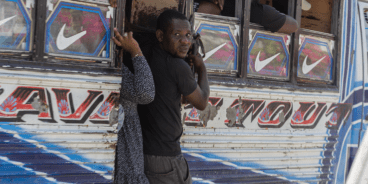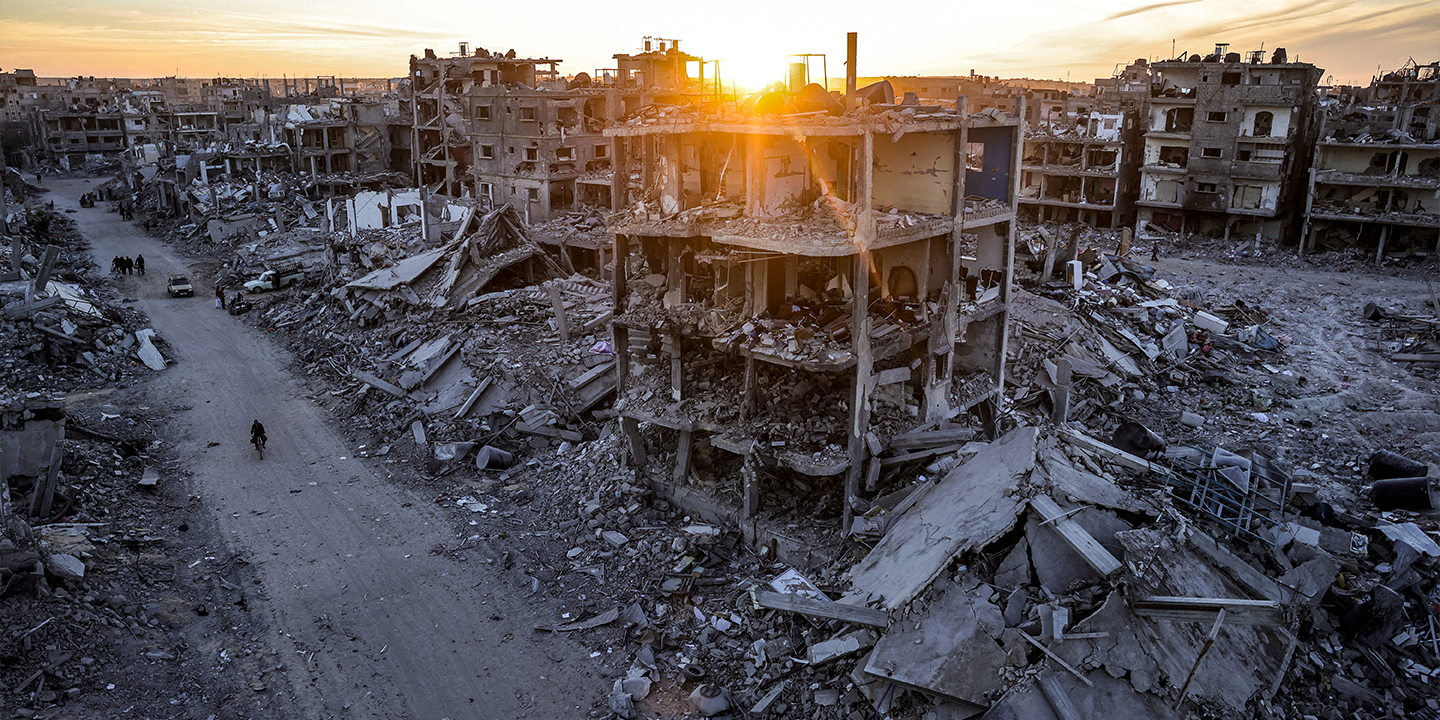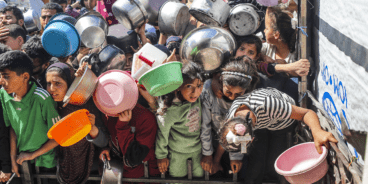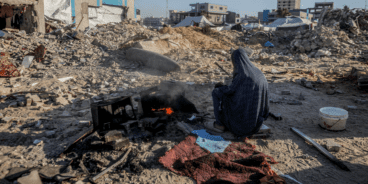

Atrocity Alert No. 424: Israel and the Occupied Palestinian Territory, Sudan and Haiti
Atrocity Alert is a weekly publication by the Global Centre for the Responsibility to Protect highlighting situations where populations are at risk of, or are enduring, mass atrocity crimes.
CEASEFIRE BRINGS RESPITE TO MILLIONS IN GAZA
On 19 January a ceasefire agreement between Hamas and Israel took effect, providing respite to over two million Palestinians in Gaza after 15 months of unrelenting death and destruction. The ceasefire agreement has three phases, the first of which includes a cessation of hostilities, the return of displaced Palestinians to their homes, a surge in the delivery of humanitarian aid, the gradual withdrawal of Israel forces and an exchange of Israeli hostages for Palestinian prisoners and detainees. In the last three days, three Israeli hostages and 90 Palestinian detainees have been released, over 2,000 trucks of humanitarian aid have entered Gaza and thousands of Palestinians have returned to northern Gaza.
Significant challenges remain ahead. Israel’s conduct against Palestinians in Gaza has been defined by a brazen disregard for international law and a horrifying scale and intensity of mass atrocity crimes, including war crimes, crimes against humanity and acts of genocide. According to Gaza’s Ministry of Health, Israel has directly killed over 46,000 Palestinians since 7 October 2023. Israel’s relentless bombardments from air, land and sea damaged or entirely destroyed more than 90 percent of homes in Gaza. While the ceasefire provides important relief to Palestinians in Gaza, the level of destruction over the past 15 months severely limits the prospects for the 1.9 million people who remain displaced to return to their previous homes.
Meanwhile, two laws adopted by the Israeli parliament in October risk undermining the stability of the ceasefire. The laws, set to take effect at the end of January, would effectively ban the UN Relief and Works Agency for Palestine Refugees in the Near East (UNRWA) from operating in the territories under Israeli control, threatening the Agency’s work in Gaza and the Occupied West Bank, including East Jerusalem. Commissioner-General Philippe Lazzarini warned that without the capacity and infrastructure of UNRWA, the UN’s humanitarian response in Gaza would “collapse” — jeopardizing the large-scale relief needed to address a looming famine, restore health and education systems and alleviate the suffering of millions. According to the UN Office for the Coordination of Humanitarian Affairs, “If not killed by bombs or bullets, people in Gaza are slowly suffocating from a lack of basic means of survival.”
Israel’s efforts to dismantle UNRWA are inconsistent with international law and in flagrant violation of its obligations as the occupying power, as well as the provisional measures ordered by the International Court of Justice. Israel must repeal its legislation and facilitate unimpeded humanitarian access. Member states should act urgently to prevent the implementation of Israel’s legislation and resolutely protect and fund UNRWA. Hamas and Israel must continue to respect the terms of the ceasefire agreement and conduct the second round of negotiations in good faith to ensure the subsequent phases of the agreement can be implemented.
IN FINAL WEEKS BIDEN ADMINISTRATION IMPOSES SANCTIONS, DECLARES GENOCIDE IN SUDAN
On 16 January the United States (US) Department of the Treasury imposed sanctions on General Abdel Fattah al-Burhan, leader of the Sudanese Armed Forces (SAF), for destabilizing Sudan and undermining efforts toward a democratic transition. In the statement, the US government asserted that the SAF, under Burhan’s leadership, “has committed lethal attacks on civilians, including airstrikes against protected infrastructure such as schools, markets, and hospitals. The SAF is also responsible for the routine and intentional denial of humanitarian access, using food deprivation as a war tactic.”
A week prior to these sanctions, on 7 January then US Secretary of State Antony Blinken concluded that members of the Rapid Support Forces (RSF) and allied militias have committed genocide in Sudan. Consequently, the US imposed sanctions on Mohamed Hamdan “Hemedti” Dagalo, leader of the RSF, for his role in systematic atrocities against the Sudanese people, as well as on seven RSF-owned companies located in the United Arab Emirates. In his statement, Blinken said, “the RSF and allied militias have systematically murdered men and boys — even infants — on an ethnic basis, and deliberately targeted women and girls from certain ethnic groups for rape and other forms of brutal sexual violence.” The determination by the Biden administration adds to its previous conclusion from December 2023 that the SAF and RSF committed war crimes and that the RSF and its allies were also responsible for crimes against humanity and ethnic cleansing.
The last time the US made a genocide determination regarding Sudan was in 2004, limited to atrocities in Darfur. The recent genocide determination sends a strong message that the US recognizes and condemns the atrocity, affirming its commitment to preventing and addressing such crimes, while drawing international attention to the situation. It increases diplomatic pressure on perpetrators, isolates them internationally and has the potential to mobilize the international community to act. This action also places responsibility on the newly installed Trump administration to urgently address atrocities in Sudan and intensify efforts to establish a permanent ceasefire and restart a civilian-led transition.
Without concrete action, a genocide determination risks losing its effectiveness and may ultimately be seen as symbolic or political rather than having any real impact. The international community must take this determination seriously and intensify efforts to address the crisis in Sudan by adopting strong measures aimed at protecting civilians and preventing further atrocities. The UN Security Council must take more decisive action, such as imposing targeted sanctions on those responsible for the genocide and extending the jurisdiction of the International Criminal Court to cover all of Sudan. Civil society organizations and community-led initiatives must be provided with the resources needed to document atrocities and collect and preserve evidence, supporting efforts toward justice and accountability.
MORE THAN 1 MILLION PEOPLE INTERNALLY DISPLACED AMID UNRELENTING VIOLENCE IN HAITI
The number of internally displaced people in Haiti has surpassed one million, marking a threefold increase in just one year and the highest recorded level of displacement due to violence in the country, according to data from the International Organization for Migration. Relentless gang violence, particularly in the metropolitan area of Port-au-Prince, Arcahaie and Artibonite, is driving the crisis. In the capital alone, displacement has nearly doubled, rising by 87 percent while displacement tripled in Artibonite last year. Displacement sites, especially in Port-au-Prince, are severely overcrowded, with limited access to essential services, and increasing protection risks.
Children are bearing a particularly great burden. The UN Children’s Fund (UNICEF) reported a nearly 50 percent increase in the number of internally displaced children since September, now representing approximately one in eight children nationwide. These children are facing extreme risks of violence, including sexual abuse and exploitation. According to UNICEF, children are increasingly forced to join gangs, with a notable 70 percent increase in child recruitment over the past year. Catherine Russell, Executive Director of UNICEF, said, “Children in Haiti are bearing the brunt of a crisis they did not create. They rely on the Haitian Government and international community to take urgent action to protect their lives and safeguard their futures.”
The Office of the UN High Commissioner for Human Rights reported that gang violence killed more than 5,600 people last year, representing an increase of over 1,000 the total killings in 2023. The UN High Commissioner for Human Rights, Volker Türk, stated, “These figures alone cannot capture the absolute horrors being perpetrated in Haiti but they show the unremitting violence to which people are being subjected.”
In December gang violence was particularly deadly, with hundreds killed in numerous attacks over several days, including in Wharf Jérémie and Petite-Rivière. Gangs also targeted medical facilities and healthcare workers in Port-au-Prince, further crippling a healthcare system already on the brink of collapse. On 24 December armed men killed several journalists and a Haitian National Police officer during a press conference announcing the reopening of the country’s largest public hospital. The incident underscores the dangers faced by journalists in Haiti, many of whom have been killed or forced to flee the country.
The Haitian authorities, with support from international stakeholders, must address the main drivers of the multidimensional crisis, including impunity for violations and abuses, corruption and entrenched economic and social inequalities, among others. The provision of emergency shelter and essential services should be scaled up, particularly in Port-au-Prince. The international community should ensure that the transitional government and the Multinational Security Support mission have the resources needed to restore the rule of law and provide basic security.
Related Content


Unified Call to Confront Famine in Gaza: Launch the Diplomatic Humanitarian Convoy Now
